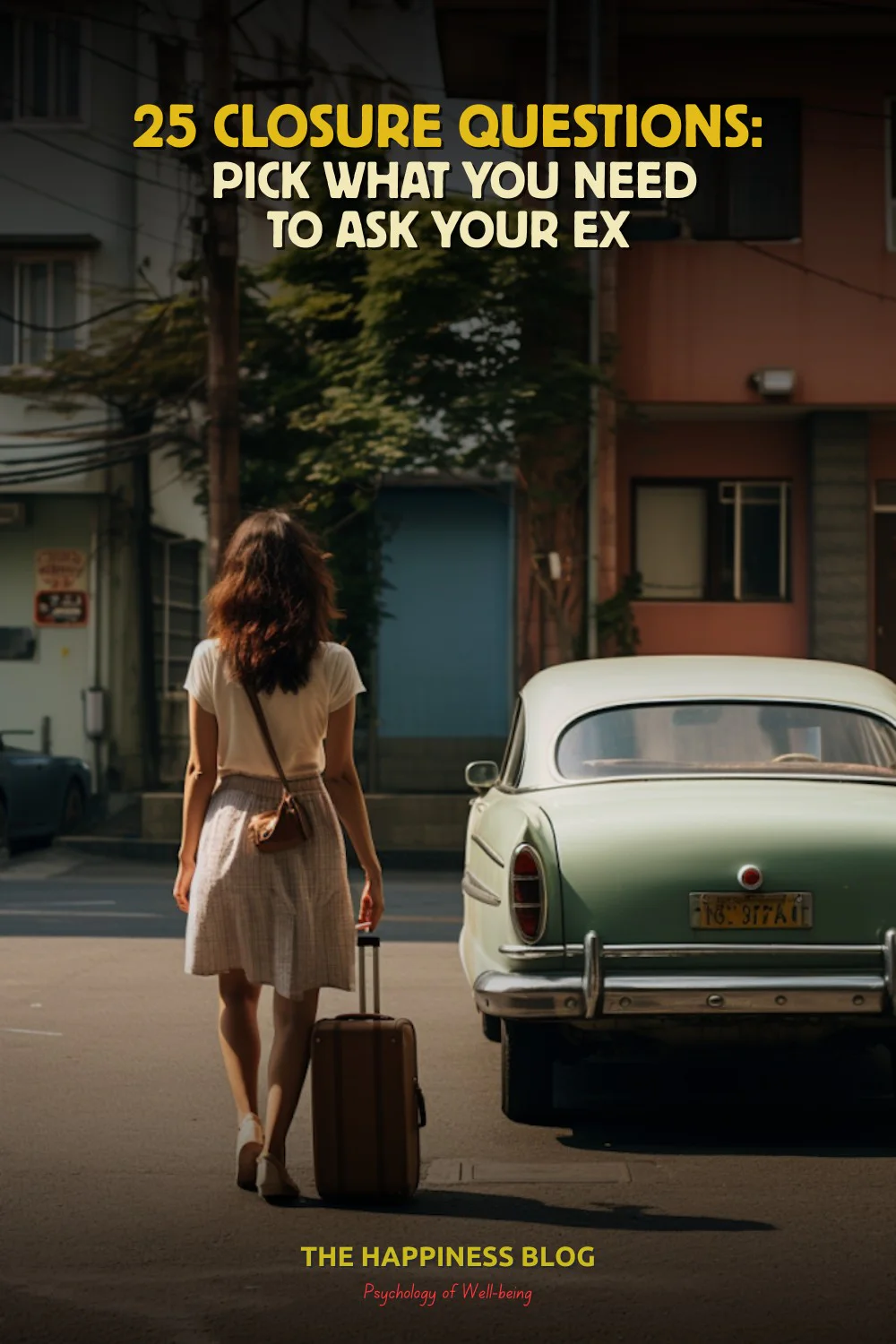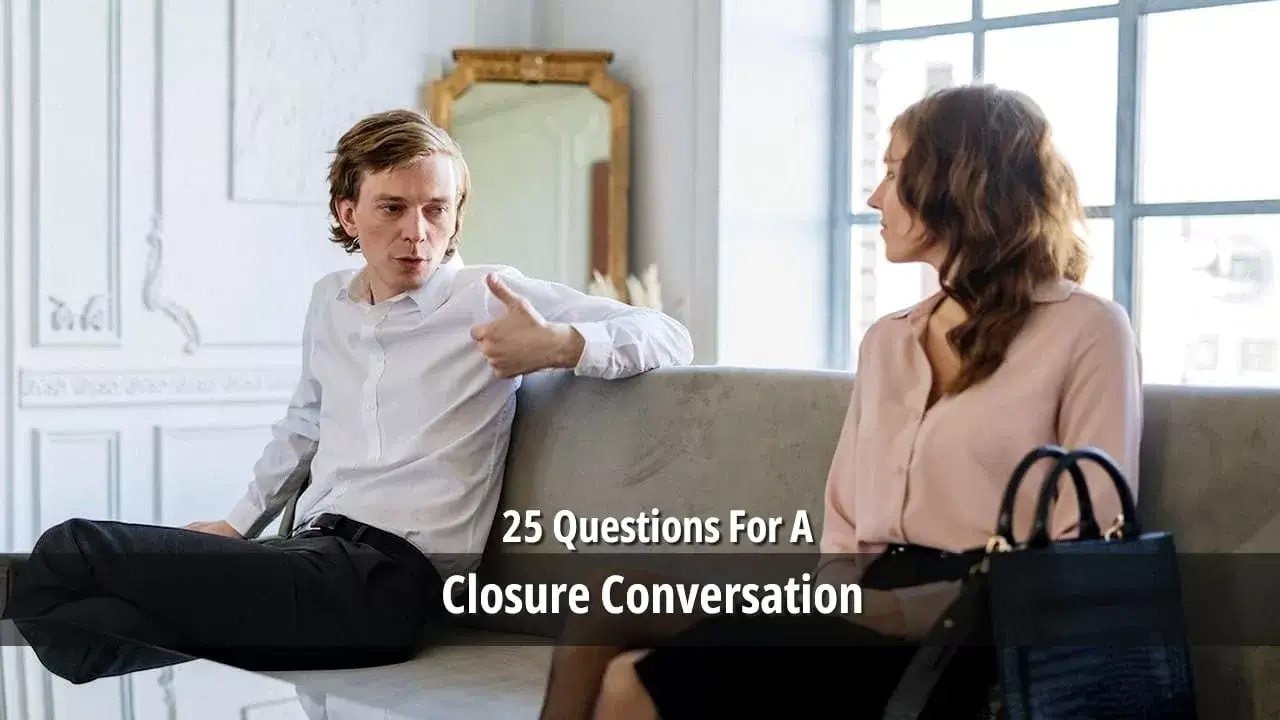Today's Saturday • 6 mins read
One vital step to moving on after a breakup is to have a closure conversation with your ex.
We go through breakups with a lot of unresolved questions on our minds. It can be so hard to decide whether to stay on or move on when you don’t have closure.
Closure is the process of finding resolution and emotional peace after a relationship ends. It helps remove future uncertainty and find answers to what went wrong.
If you’re looking to have an open and honest closure conversation with your ex, you may be wondering where to start. You have to ask the right questions in a closure talk.
What A Closure Conversation Is
- A closure conversation is a planned dialogue where both people speak honestly about why the relationship ended.
- It provides space to hear each other’s perspectives, express unsaid thoughts, and understand the emotional and practical reasons behind the breakup.
- It reduces the uncertainty that often lingers after a relationship ends.
A closure conversation should only happen once, so it’s helpful to go in with a list of closure questions.
We’ve compiled a list of 25 closure questions for you to ask your ex after the breakup.
25 Questions To Choose From In A Closure Conversation
Use these questions as a pool to choose from. You only need those few that help you leave the conversation with clarity rather than confusion.
5 Questions to Understand the Relationship Dynamics
- When did you feel most connected to me?
- What did you value most in our relationship?
- When did you feel the connection start to weaken?
- What parts of our relationship felt difficult or draining for you?
- What do you think were the core patterns that caused ongoing friction between us?

5 Questions to Understand Their Perspective
- What did you feel you needed from me that you didn’t get?
- How did our relationship shape you, both positively and negatively?
- How do you view our compatibility now that some time has passed?
- How did you interpret the main turning points that led to the breakup?
- Do you think our communication style made our disagreements easier or harder?
5 Questions That Offer Emotional Closure
- Is there something you wish you had done differently?
- Is there anything you wanted to say earlier but held back?
- What would you like both of us to leave behind as we move forward?
- Is there something you want me to know about how you experienced the end?
- What do you think was the most honest reason we could not continue together?
5 Questions That Clarify Feelings Without Reopening Old Wounds
- How do you feel about our relationship today?
- How did you feel in the days after the breakup?
- How did you feel during the last phase of the relationship?
- What helped you settle your own thoughts after the breakup?
- What emotions still come up for you when you think about the relationship?
5 Questions That Help You Move Forward
- What personal habits or patterns do you think got in the way for both of us?
- What do you think I may need to understand about myself going forward?
- What did the relationship teach you about your needs and limits?
- What helped you accept the breakup and make peace with it?
- Is there something you want for me as I move on with my life?

Are Closure Conversations Helpful
Closure works only when both accept that the relationship has ended.
A closure conversation gives you better insight into what happened. It clears disagreements and reduces the urge to keep revisiting the past. Many people walk away with steadier emotions and less self-blame.
However, it may not help if someone is defensive, withholding details, or speaking from fear or guilt. It also fails when one person treats it as a way to reopen the bond.
How To Keep The Conversation Safe
A closure message works best when it is simple, clear, and respectful. It should help both of you leave with a sense of finality, letting you move on without bitterness.
Keep the conversation limited. End it once the main questions are answered. Thank them for their honesty if they show it. State that you are moving forward. You do not need to agree with everything. You only need clarity.
If the answers feel vague or incomplete, remember that closure is not about perfect information. It is about creating emotional certainty for yourself. Much of that work happens after the conversation.
FAQs
1. What are your hopes for the future?
This question gives you an idea of where they stand now and what they want next in life. It can help you accept that both of you are moving in separate directions. Avoid this question if you feel attached or vulnerable.
2. What would you have done differently?
This question can help you understand how your ex views the relationship now. It offers insight into the choices they would change and the parts they found difficult. Use it only if you feel steady. Some answers can be blunt or incomplete.
3. Do you have any regrets?
This question helps you understand how they processed the breakup. People regret different things for different reasons, so their answer may give context but not full clarity. Listen without reading too much into it.
4. What was your favorite memory of us?
This can highlight the positive parts of the relationship and help you close the chapter with a balanced view. It is useful only if it doesn’t pull you back into longing or nostalgia.
5. What did you learn about relationships from our time together?
This helps you understand how they interpret relationship health and disputes. It can guide your own reflection on what worked and what didn’t.
Final Words
A closure is not about getting back together, blaming each other, or claiming who sacrificed more. It’s about accepting the end and finding peace.
Thank them. If you feel there are still unresolved queries, tell them how long each of you might be available to answer them.
Allow yourself time to grieve the end of the relationship and process the closure. Commit to your well-being and growth, and trust that the future holds great things for you.
A closure conversation with your ex t can be particularly challenging if you’re seeking closure with an ex after years of separation.
Seek the guidance of a therapist or counselor if you feel too stressed to handle the breakup.
• • •
√ Also Read: 7 Practical Ways To Cut Off Toxic Friends Without Being Rude
√ Please share this if you found it helpful.
» You deserve happiness! Choosing therapy could be your best decision.
...
• Disclosure: Buying via our links earns us a small commission.
